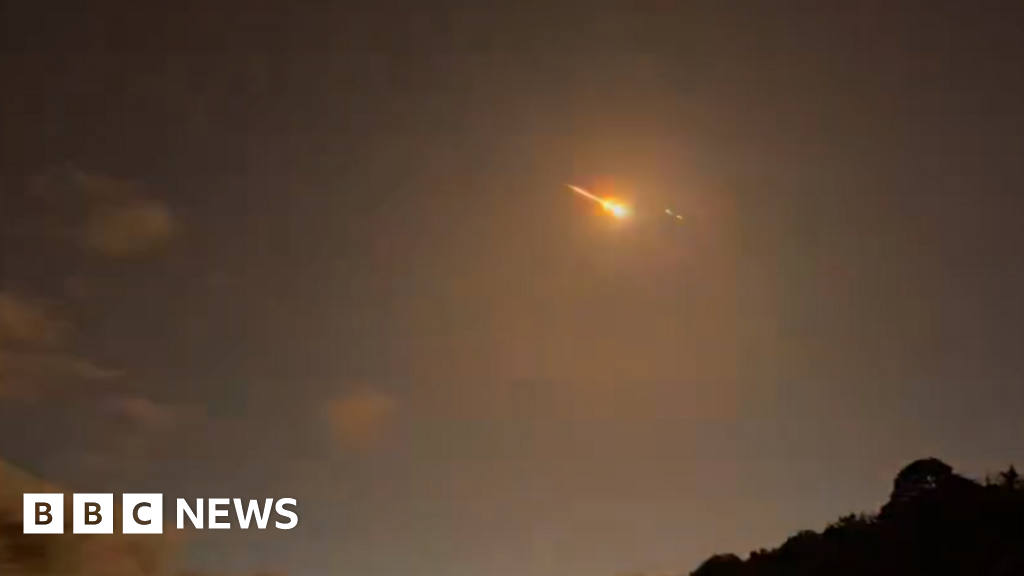Astonished Scots have captured a meteor streaking and burning brightly across the night sky. The orange light and accompanying bang was spotted at about 00:50 by people on the Isle of Lewis, Stirling, Glasgow and in Argyll and Bute. Gillian-Isabella McLaughlin, who was walking her dog in Airdrie, North Lanarkshire, when the whole sky was lit up, said it was "the most thrilling sight" she had ever witnessed. Meteors are so named when matter enters Earth's atmosphere and often make a spectacular appearance as they burns and create streaking lights through the sky. Andy McNeill, who saw the event in Appin, Argyll and Bute, said: "There was a bright flash over the house which also caused the wi-fi to reset, and then maybe 20 to 30 seconds later an explosive bang. "There was also contrail in the sky, striking broadly east to west." Rachel Sutherland, from Inverness, said: "I saw a bright flash but wasn't sure what it was." Another observer at Glen Lyon in Perthshire said they saw a flash in the sky at around 00:50 followed a few minutes later by a rumble in the air. Gemma Henderson, who saw the event from her living room in Aberfeldy, Perthshire, said: "I thought it must have been a lightning bolt. "I have the lightning tracker app on my phone, so checked that and found that there had been no lightning present. "Then there was a loud noise, so thought the tracker must have been incorrect. It was extremely bright." Merseyside lorry driver Ringolds Abolins spotted it while driving up to Glasgow on the M74. He said: "It burned out in two to four seconds. It was so quick and was small green line behind. "I thought in first moment it was a kind of rocket or missile." Other people have reported seeing a "bright flash" through their house window in Inverness, while others caught sight of the meteor from Jura. HM Coastguard told BBC Scotland News it had received several reports related to the meteor overnight, including an alert to unidentified lights at the Tay Road Bridge at about 01:02. A spokesperson said: "Broughty Ferry lifeboat was called to investigate alongside Dundee Coastguard Rescue Team and with nothing untoward found, the search was stood down. "The sighting was believed to have been related to a meteorite shower reported across parts of the UK." What did people see? US space agency Nasahas a handy guide. Meteoroids are rocks still in space, and vary in size from grains of dust to small asteroids. Meteors are meteoroids that enter Earth's atmosphere. They enter at high speed and burn up. The fireballs are nicknamed shooting stars. And meteorites are meteoroids that survive their journey through the atmosphere and hits the ground. Nasa said an estimated 48.5 tons of meteoritic material falls on Earth each day - almost all of it burns up in the atmosphere.
Meteor burns brightly across night sky in Scotland
TruthLens AI Suggested Headline:
"Scots Witness Meteor Lighting Up Night Sky with Loud Bang"
TruthLens AI Summary
Residents across Scotland were left in awe as a meteor blazed through the night sky, creating a stunning display of orange light accompanied by a loud bang. The event occurred around 00:50 and was witnessed by individuals in various locations including the Isle of Lewis, Stirling, Glasgow, and Argyll and Bute. Gillian-Isabella McLaughlin, who was out walking her dog in Airdrie, described the sight as 'the most thrilling' she had ever seen. Other observers, such as Andy McNeill from Appin, reported a bright flash followed by a noise that caused their Wi-Fi to reset, suggesting the meteor's explosive nature. Witnesses noted a contrail stretching broadly across the sky, indicating the meteor's path as it traveled from east to west. Rachel Sutherland in Inverness saw the flash but was uncertain about its nature, while a resident in Glen Lyon experienced a similar flash followed by a rumble, further highlighting the widespread visibility of the event.
The meteor phenomenon prompted various responses, with some people speculating on its origin. For instance, Merseyside lorry driver Ringolds Abolins initially thought it might have been a rocket or missile due to its swift movement and bright appearance. Additionally, reports from HM Coastguard indicated that they received multiple calls regarding the meteor, including an alert about unidentified lights at the Tay Road Bridge shortly after the sighting. Coastguard teams investigated but found nothing unusual, concluding the reports were related to the meteor shower that had been noted across parts of the UK. NASA provided context by explaining that meteoroids, which can range from tiny dust particles to larger asteroids, become meteors when they enter Earth's atmosphere at high speeds, often resulting in spectacular displays known as shooting stars. On average, approximately 48.5 tons of meteoritic material falls to Earth daily, with most of it burning up before reaching the ground.
TruthLens AI Analysis
You need to be a member to generate the AI analysis for this article.
Log In to Generate AnalysisNot a member yet? Register for free.
